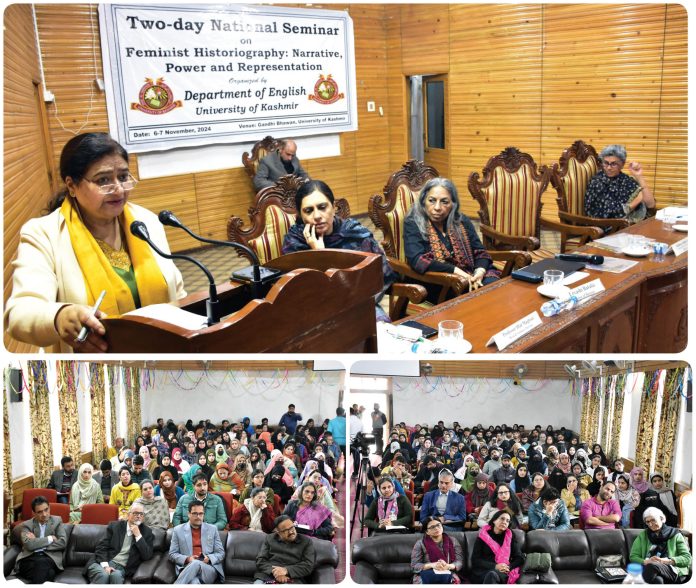Essential to document, explore women’s contributions to shaping feminist history: KU VC
SRINAGAR: To provide a platform to scholars and faculty and engage in discussions on the role and representation of women in historical narratives, the University of Kashmir (KU), Wednesday inaugurated a two-day national seminar here.
Titled, ‘Feminist Historiography: Narrative, Power and Representation’, the event is being organised by the varsity’s Department of English.
On the occasion, KU Vice Chancellor, Prof Nilofer Khan, emphasised the importance of continued engagement in feminist historiography and stressed the value of collaborative research to drive such initiatives forward.
“It is essential to study and document women’s contributions to history and explore their role in shaping feminist history,” she said, highlighting the need to understand and document women’s roles in historical narratives.
“That not only enriches academic scholarship but also develops a broader societal appreciation of women’s impact throughout history,” Prof Khan reiterated.
Former faculty, Centre for Historical Studies, JNU (Jawaharlal Nehru University), Prof Janaki Nair and the keynote speaker, shed light on the contributions of prominent scholars studying Indian history through a feminist perspective.
“Gender analysis is not limited to documenting women alone. Our duty as feminist historians is to challenge established narratives and create space for alternative viewpoints,” she said.
Eminent historian, author and publisher, Urvashi Butalia, spoke on the challenges feminist historians face due to fragmented and scarce historical sources about women.
“Feminist historians often face the absence of women in traditional sources. Documenting these narratives helps shift from individual histories to collective ones, amplifying diverse voices, including those of marginalized women,” she said, underlining the growing inclusivity in feminist writings.
Head, Department of English, KU and Seminar Coordinator, Prof Iffat Maqbool, in her welcome address, underlined the seminar’s aim to “create a space for meaningful discourse”.
“Feminist narratives function as alternative histories and provide critical knowledge that reshape our understanding. We hope to explore this topic in a comprehensive manner,” she said.
Prof Mufti Mudasir Farooqi, faculty at KU’s Department of English, conducted the proceedings of the inaugural session that was attended by faculty members, scholars and participants from the campus and various institutions, including Jamia Millia Islamia (JMI), Aligarh Muslim University (AMU) and universities from West Bengal, Haryana and Punjab.


